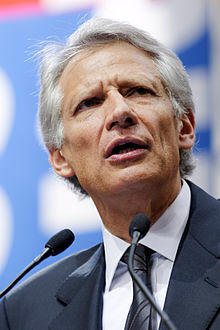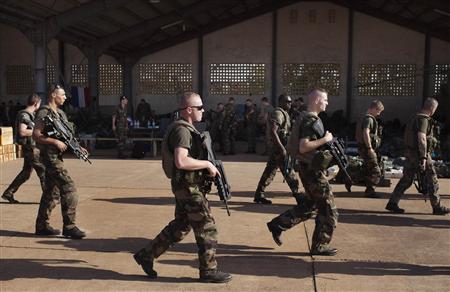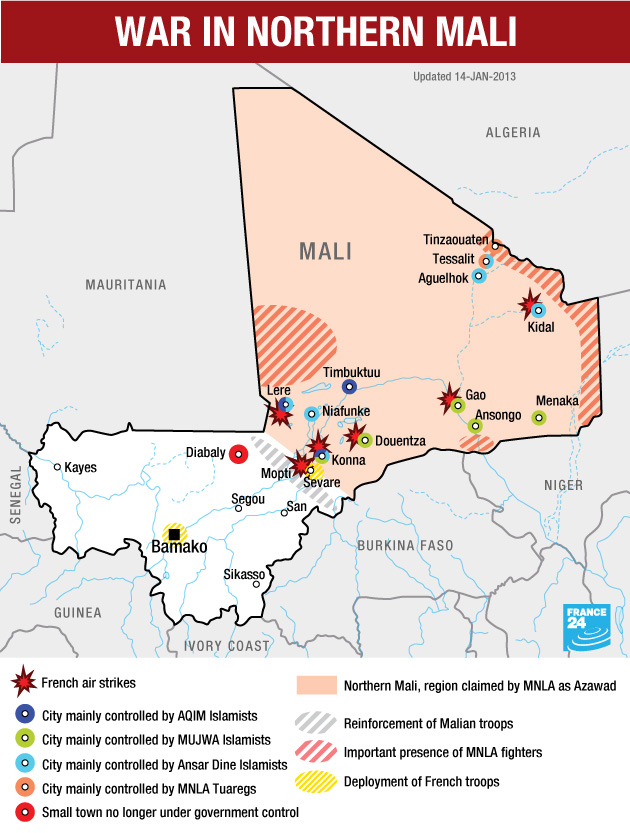Opinion Editorials, January 2013
www.aljazeerah.info
Archives
Mission & Name
Conflict Terminology
Editorials
Gaza Holocaust
Gulf War
Isdood
Islam
News
News Photos
Opinion Editorials
US Foreign Policy (Dr. El-Najjar's Articles)
France Flexes its Imperialist Muscles in Africa, Again!
By Hassan El-Najjar
Al-Jazeerah, CCUN, January 16, 2013
The French plunder in West African country of Mali and the East African country of Somalia this week demonstrates once again that there's no difference between liberals and conservatives in foreign policy.
The Liberal socialist Hollande is demonstrating that he is not a lesser imperialist than the conservative Sarkozy, who spearheaded the US-EU intervention in the Libyan revolution.
As Dominique de Villepin put it, this plunder shows that "France has failed to heed the lessons of history." Invasions and occupation of foreign nations will ultimately lead to resistance, blood-shedding, and corruption at home.
It seems that France is mandated by global Zionists to fight their wars to subjugate revolting Muslim nations in Africa, as did US-UK in the Middle East, and bearing the same consequences, particularly sinking in debt and financial crises.
Wise and honest people, like Dominique de Villepin, are pushed aside, while Zionist-controlled puppets drag their nations to disasters.
***
Former PM Villepin warns of 'blind' Mali intervention
Ten years ago, former French prime minister Dominique de Villepin argued France’s opposition to the US-UK invasion of Iraq at the United Nations. He is now worried about France’s military mission to Mali, saying Paris has failed to heed the lessons of history.
By Tony Todd (text), AFP
FRANCE 24 (text), January 14, 2013

Former French prime minister Dominique de Villepin has warned that military intervention in Mali risked dragging the country into an interminable conflict in the former French colony, was ill thought-out, and “not the French way”.
In an editorial for the Sunday newspaper, Le Journal du Dimanche, Villepin compared France’s mission to stem Islamist advances into southern Mali to “a decade of lost wars in Afghanistan, Iraq and Libya”.
Villepin is one of France’s most venerable diplomats, famous for his speech to the United Nations in 2003 that passionately outlined France’s case against the US-UK invasion of Iraq.
FRANCE 24 Who are the rebel groups holding northern Mali?
In this Sunday's editorial, the former prime minister, who attracted the scorn of the US leadership for his country’s firm “Non” to the Iraq War, demanded: “How has the neo-conservative virus been able to infect our outlook?
“This unanimous enthusiasm for war, the haste with which we’re doing it, and the déjà-vu of ‘war on terror’, worries me.
“We will be fighting blind without any reason for actually going to war. Stopping the jihadists from moving south, reconquering the north of the country and eradicating AQIM [Al-Qaeda in the Islamic Maghreb] are all completely separate war aims.”
Villepin went on to decry the weakness of the Bamako-based Malian government, which was the victim of a military coup in March 2012 that precipitated the Islamist conquest of the vast northern half of the country.
“We will be fighting alone without a reliable Malian partner,” he said. “With the removal of the Malian president in March and its prime minister in December, with the collapse of the deeply divided Malian army, and amid the wholesale failure of the Malian state, who can we rely on for backup?”
France was wholly lacking in regional partners, he added, citing reticence from Algeria, another former French colony that shares a huge desert border with northern Mali, as well as the failure of the Economic Community Of West African States (ECOWAS) to respond to the crisis.
Only politics and dialogue could save Mali from its woes, he argued, saying the only viable solution was to rebuild the country while encouraging regional partners – notably ECOWAS and Algeria – to step up efforts to restore order to the lawless Sahel region.
“What is needed is a political effort to negotiate with the various parties while isolating the Islamists and bringing the Touareg [nomadic tribes of the Sahel] together towards a reasonable solution,” Villepin wrote.
He concluded that since the Iraq War, he had “not stopped arguing for political resolution of crises away from the vicious cycle of armed force”.
“Today, our country can open a way to get us out of the warlike impasse we find ourselves in, if we can come up with a new model of engagement based on the realities of history, on peoples’ aspirations and with respect for their identities,” he wrote.
“This is France’s responsibility to history.”
Villepin’s was the only strong voice of opposition against France’s intervention in Mali until Monday, when far-left leader Jean-Luc Mélenchon complained that France was acting unilaterally and beyond a UN-mandated plan for ECOWAS to deploy troops to retake northern Mali from the rebels in the coming months.
“The UN mandate stipulated that this was an African problem to be resolved by Africans,” he told reporters. “Doesn’t Algeria, which shares a border with Mali, have an extremely advanced army?
“Resolving this situation is a job for Africans. They’re grown-ups, they have real countries, but yet again we find ourselves going back to our old bad habits of intervening here and there on the continent. We haven’t learned a single lesson.”
***France seeks allies in Mali operation
French Foreign Minister Laurent Fabius said on Monday that it was not France’s intention to continue to act alone in Mali, as a joint Malian-French military operation to retake the country’s Islamist-controlled north entered its fourth day.
By Clovis CASALI (video), AFP
FRANCE 24 (text), January 14, 2013
French Foreign Minister Laurent Fabius said on Monday it was not France’s role or intention to continue to act alone in Mali, as French troops joined Malian forces on the ground to reclaim the country’s Islamist-controlled north for a fourth day.
Speaking to journalists in Paris on Monday, Fabius said France’s intervention in the unstable West African country had received overwhelming international support, as well as the full backing of the United Nations.
French Foreign Minister Laurent Fabius says France will not continue to act alone in Mali
“We are not alone in this. The international political support we have is almost unanimous,” Fabius said. “It isn’t France’s role to operate alone in Mali.”
Fabius also announced that EU foreign ministers plan to hold an emergency meeting at the end of the week to evaluate the situation in Mali, as well as how European countries can best aid a planned African-led military intervention in the country.
“By intervening in Mali, France has assumed its international responsibility and fulfilled its international obligations. Key interests were at stake for us, for Africa, for Europe and for the entire international community, so we had to act quickly because of the emergency situation,” Fabius added.
‘We will strike at the heart of France’
France’s decision to intervene in Mali has drawn the ire of rebels, who vowed to retaliate on Monday by launching attacks on French soil.
"France has attacked Islam. We will strike at the heart of France," Abou Dardar, a leader of Movement for Oneness and Jihad in West Africa (MUJAO), one of the Mali-based groups with ties to al Qaeda, told the AFP news agency.
Asked where attacks would take place, Dardar said: "Everywhere. In Bamako, in Africa and in Europe."
Mali appealed to France for military assistance last week, before the two countries announced a joint offensive on January 11 to retake the north from Islamist forces. The region – which is largely made up of vast expanses of desert and is roughly the size of France – first fell under the control of Islamist militants allied with Mali’s Tuareg-led separatist movement, the MNLA, in April.
The fall of Diabaly
Malian and French soldiers, backed by heavy French military air support, pushed back rebel fighters from the central town of Konna over the weekend, while a dozen French fighter planes, including four Rafale jets, hit rebel targets in the cities of Goa and Kidal, deeper in the country’s rebel-held north. Residents in Goa said French air raids had struck bases and destroyed weapons depots.
Despite the offensive, Islamists continued to gain ground on Monday after seizing control of the central town of Diabaly, putting them 350 kilometres (220 miles) from the capital Bamako.
French Defence Minister Jean-Yves Le Drian confirmed the news on Monday on France’s BFM television.
“They took Diabaly… after fierce fighting and resistance from the Malian army, which was not able to hold them off at that moment,” he said.
Building up before ground campaign
The operation to retake the north has received the official backing from the Economic Community of West African States (ECOWAS), of which Mali is a member, and has been promised logistical support from the United States and Britain.
Malian troops on the ground and around 550 French soldiers deployed so far are awaiting the arrival of a 3,300-stong multi-nation African force. French President François Hollande said French involvement would last “as long as is necessary.”
Mali’s separatist Tuareg rebels ‘ready to help’ French forces
Mali’s separatist Tuareg rebel movement, the MNLA, has said it is ready to back a joint French-Malian offensive against Islamist militants in control of the northern half of the country.
"We're ready to help, we are already involved in the fight against terrorism," Moussa Ag Assarid, an MNLA official told news agency AFP by telephone from northern Mali on Monday.
The MNLA, a former ally of Islamist group Ansar Dine, originally helped take over northern Mali in April 2012, before an uneasy power-sharing arrangement between the two groups eventually unraveled.
French army commander Colonel Paul Gèze told Malian television on Sunday that the French military contingency would reach full strength on Monday, but would primarily be deployed around the capital of Bamako to protect the 6,000-strong French expatriate community.
The Malian army was preventing journalists from travelling further north from the town of Sevare on Sunday.
According to FRANCE 24’s Matthieu Mabin, who was in the city of Sevare, residents eagerly awaited the arrival of French troops and supported a ground offensive into rebel-controlled areas. “We have not come across a single Malian who is against France’s intervention,” Mabin said.
“It seems to be that the French intervention has saved Mali,” Alain Mallet, a French national and resident of Sevare told FRANCE 24. “The Islamist groups were a few kilometres from here and everyone knew that the Malian army was completely overwhelmed.”
But Human Rights Watch said ten civilians, including three children, had died as a result of the French bombing campaign in Konna. The London-based rights group said the joint Malian-French offensive posed grave risks to the civilian population, and called on Islamists to release child soldiers they had recruited in Mali and Niger in recent months.
Malian army sources have said that dozens of rebels have been killed near the frontline, including Abdel Krim, nicknamed “Kojak”, a key leader of Ansar Dine, another Islamist group now facing French air power.
Mali's interim president, Dioncounda Traore, said that 11 Malian soldiers had died in fighting over the weekend.
West African army chiefs to approve Mali troops plan | Reuters
By Bate Felix
Mon Jan 14, 2013 8:25pm EST
BAMAKO (Reuters) -

French soldiers in Bamako
West African defense chiefs will on Tuesday approve plans to speed up the deployment of African troops against Islamist rebels in northern Mali, with some regional soldiers seen arriving next week.
France has already poured hundreds of troops into Mali and carried out days of air strikes in a vast desert area seized last year by an Islamist alliance that combines al Qaeda's north African wing AQIM with Mali's home-grown MUJWA and Ansar Dine rebel groups.
Western and regional powers are concerned the insurgents will use Mali's north as a launchpad for international attacks.
"On January 15, the committee of Chiefs of Defense Staff will meet in Bamako to approve the contingency plan," the mission head of the ECOWAS grouping of West African states, Aboudou Toure Cheaka, told Reuters.
"I can tell you that in one week, the troops will effectively be on the ground," he said, adding their immediate mission would be to help stop the rebel advance while preparations for a full intervention plan continued.
He did not say how many soldiers would arrive.
The original timetable for the 3,300-strong U.N.-sanctioned African force - backed by western logistics, money and intelligence services - did not initially foresee full deployment before September due to logistical constraints.
Senegal, Burkina Faso, Niger, Nigeria and Guinea have all offered troops. But regional powerhouse Nigeria, which is due to lead the mission, has cautioned that even if some troops arrive in Mali soon, training will take more time.
The plan is being fast-tracked after France rushed to respond to a plea for help by Mali's government after mobile columns of Islamist fighters last week threatened the central garrison towns of Mopti and Sevare, with its key airport.
The French defense ministry said on Monday it aimed to deploy some 2,500 soldiers to Mali to bolster the Malian army and the eventual West African force.
"SAFEGUARD MALI"
French Prime Minister Jean-Marc Ayrault said France's goals were to stop the Islamist rebels, to "safeguard the existence of Mali" and pave the way for the African-led military operation.
U.S. officials said Washington was sharing information with French forces in Mali and considering providing logistics, surveillance and airlift capability.
"We have made a commitment that al Qaeda is not going to find anyplace to hide," U.S. Defense Secretary Leon Panetta told reporters as he began a visit to Europe.
As French aircraft bombarded mobile columns of Islamist fighters, other insurgents launched a counter-attack further to the south, dislodging government forces from the town of Diabaly, 350 km (220 miles) from Bamako.
French intervention has raised the threat for eight French hostages held by al Qaeda allies in the Sahara and for 30,000 French expatriates living in neighboring, mostly Muslim states. Concerned about reprisals at home, France has tightened security at public buildings and on public transport.
The U.N. said an estimated 30,000 people had fled the latest fighting in Mali, joining more than 200,000 already displaced.
U.N. Secretary-General Ban Ki-moon on Monday welcomed the French-led military intervention in Mali and voiced the hope that it would halt the Islamist assault.
Amnesty International said at least six civilians were killed in recent fighting in the town of Konna, where French aircraft had earlier bombarded rebel positions, and called on both sides to spare non-combatants.
France, which has repeatedly said it has abandoned its role as the policeman of its former African colonies, is among the toughest proponents of a speedier deployment of the African troops, and convened a U.N. Security Council meeting Monday to discuss the crisis.
French U.N. Ambassador Gerard Araud told reporters after the meeting that the U.S., Canada, Belgium, Denmark and Germany had also offered logistical support for France's Mali operation.
"I felt that all the members of the Security Council were expressing their support (for) and understanding of the French decision," Araud told reporters.
No Europeans or other African Union members will be allowed in the defense chiefs meeting in Bamako on Tuesday, a western diplomat told Reuters, requesting not to be named.
"They don't want any French pressure at the meeting," the diplomat said.
(Reporting by Bate Felix; Additional reporting by Michelle Nichols and Louis Charbonneau at the United Nations Richard Valdmanis in Dakar, Brian Love in Paris and David Alexander in Lisbon; Editing by Richard Valdmanis and Giles Elgood)
Fair Use Notice
This site contains copyrighted material the use of which has not always been specifically authorized by the copyright owner. We are making such material available in our efforts to advance understanding of environmental, political, human rights, economic, democracy, scientific, and social justice issues, etc. We believe this constitutes a 'fair use' of any such copyrighted material as provided for in section 107 of the US Copyright Law. In accordance with Title 17 U.S.C. Section 107, the material on this site is distributed without profit to those who have expressed a prior interest in receiving the included information for research and educational purposes. For more information go to: http://www.law.cornell.edu/uscode/17/107.shtml. If you wish to use copyrighted material from this site for purposes of your own that go beyond 'fair use', you must obtain permission from the copyright owner.
|
|
|
|
||
|
||||||



